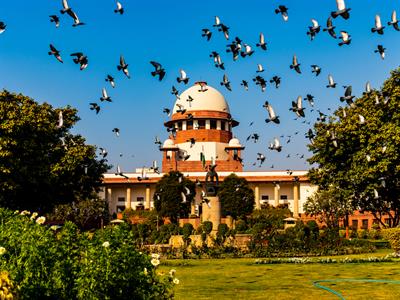
PUMPA - SMART LEARNING
எங்கள் ஆசிரியர்களுடன் 1-ஆன்-1 ஆலோசனை நேரத்தைப் பெறுங்கள். டாப்பர் ஆவதற்கு நாங்கள் பயிற்சி அளிப்போம்
Book Free DemoSupreme Court
The Indian Constitution has adopted a single system of the court from the Government of India Act 1935, which allows it to deal with the cases of both the Centre and the States.

Supreme Court of India
The Integrated Judiciary concept places the Supreme Court on top of the Judicial system. Located in New Delhi, the Supreme Court exerts control of the courts of the country.
Supreme Court: The Supreme Court is the “Protector of Fundamental rights and also the guardian and the final interpreter of the Constitution”.
The Supreme Court also derives certain Jurisdictional and Operational powers from the Constitution, which are discussed below.
1. Original Jurisdiction:
This is one of the unique powers bestowed on the Supreme Court to hear disputes of federal nature. No other court in India is empowered to take up cases of federal nature.
It hears three types of federal cases that are given below.
- A dispute between the Centre and one or more states.
- A dispute between two states.
- A dispute between the Centre and a state on One side and a state on the other side.
The dispute between the parties must involve a “question of law”; only then it is entertained under the original Jurisdiction.
2. Appellate Jurisdiction:
Being the highest court of appeal replacing the Privy Council of England, the Supreme Court hears appeals from the lower courts, including the High Court.
The Supreme Court hears appeals regarding cases related to Constitutional matters, Special leave, Criminal and Civil matters of the Country.
3. Writ Jurisdiction:
The Supreme Court is hailed as the guarantor of fundamental rights in the country. This writ issuing authority of the Supreme court is confined only to the matters of Fundamental rights. While the writ jurisdiction of the High court is wider than the Supreme Court as it is empowered to issue writs for all matters.
Article 32: This article of the constitution empowers the Supreme Court to issue writs in case of violation of the Fundamental Rights.
4. Advisory Jurisdiction:
Article 143 of the Constitution enables the Supreme Court to advise the President when the President seeks an opinion from the Apex court. This kind of Jurisdiction is also known as “Consultative Jurisdiction”.
5. A Court of Record:
The Supreme Court also acts as a court of record, where the verdicts, evidence, and other documents of the old cases are preserved. These records cannot be questioned in any court when produced.
6. Other Powers:
Some of the other Powers of the Supreme Court includes the Power of Judicial review, by which the Supreme court can review any of the verdicts issued by the lower courts.
This power also includes the power to evaluate the constitutionality of legislation enacted by the Centre and the States.